Steven Lyle Jordan's Blog, page 59
May 16, 2013
Doc Savage: The mold from which heroes were and are made
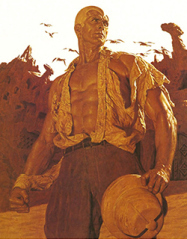 It was recently announced that Iron Man 3 director Shane Black is in discussion to helm a new movie for Sony, starring the pulp hero Doc Savage. A friend of mine saw this, and correctly guessed that I would squee upon hearing the news.
It was recently announced that Iron Man 3 director Shane Black is in discussion to helm a new movie for Sony, starring the pulp hero Doc Savage. A friend of mine saw this, and correctly guessed that I would squee upon hearing the news.
Why? I grew up reading the famous “181 Supersagas” of Doc Savage—also known as the Man of Bronze—and his friends Monk Mayfair, Ham Brooks, Renny Renwick, Johnny Littlejohn and Long Tom Roberts, occasionally joined by Doc’s cousin Pat Savage, as they raced around the world, investigating scientific mysteries, righting wrongs, and punishing evil-doers wherever they were found. Doc and his friends were among the very first “science heroes,” those who embraced the modern world of steel and wonder, and who used science and intellect to solve mysteries and save the day… but with plenty of very unscientific fisticuffs and derring-do thrown in for excitement. Doc Savage, the leader of the group, was no less than the template that future superheroes would be based upon for the balance of the 20th century.
Dr. Clark Savage, Jr. was called the “Man of Bronze” because of his uncanny appearance, a towering and herculean build—physical perfection, swathed in a skin fetchingly tanned by tropical suns. Doc was quite literally a product of science, raised as a boy under the constant tutelage of numerous dedicated male scientists, experts in all of the arts and sciences, including those of the body. He was taught many skills and disciplines from boyhood to late adolescence, by order of his father, Clark Savage, Sr., reportedly to atone for some unstated wrong he had done in the past. Doc was to be his father’s version of the 20th century’s ideal man, engineered to be perfect in mind and body, and dedicated to helping and protecting others.
Together with his colleagues—each an expert in their respective fields, though none quite as brilliant as Doc himself—Doc and the Fabulous Five (coined well before the recent hijacking of that title by a certain group of not-so-macho fashion designers) were an unstoppable force for good, renowned internationally and feared by the biggest to the lowliest bad guys. Doc was a philanthropist and a selfless hero, demanding (over the objection of U.S. officials) to be allowed to participate in World War II to defeat the Nazis. He would pause in pursuit of a criminal to give a blind woman a card that would grant her access to a hospital, where he himself would perform a difficult operation that would save her sight, at no cost to her. He had honorary police credentials in most metropolitan cities in the United States, and many around the world. He did use guns, but preferred to arm them with “mercy” bullets, quick-working anesthetics that would subdue rather than kill their enemies. He owned a wealth of air and water craft, maintained his home and lab on the 86th floor of the Empire State Building (the tallest building in the world at the time), and kept his own hidden “Fortress of Solitude” somewhere above the Arctic Circle.
He even thought science could cure crime, through brain operations made upon criminals that would remove their anarchic nature and put them on the path to honest and peaceful lives. So, okay, nobody bats a thousand… but it was the thought that counted…
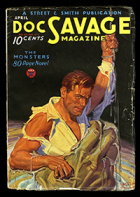 Doc’s exploits featured villains that used the extrapolations of 20th century super-science to hurt, kill and dominate others; and Doc often turned their science against them, using his own genius and intellect. He helped young men along a healthy curiosity towards science, in much the same way that Star Trek has reputedly propelled many a young boy and girl into scientific pursuits and positions as researchers, engineers, astronauts and masters in their field.
Doc’s exploits featured villains that used the extrapolations of 20th century super-science to hurt, kill and dominate others; and Doc often turned their science against them, using his own genius and intellect. He helped young men along a healthy curiosity towards science, in much the same way that Star Trek has reputedly propelled many a young boy and girl into scientific pursuits and positions as researchers, engineers, astronauts and masters in their field.
The Doc Savage adventures were inspirational to boys (and men) in the 30s and 40s, seeking exciting and science fictional adventure, and something to aspire to. They were inspirational to others as well… like Jerry Siegel and Joe Shuster, who patterned their own character, a certain “Man of Steel,” after Doc… and Bob Kane and Bill Finger, who created their own scientifically-trained ultimate hero and put a cape and bat-ears on him. It can certainly be said with conviction that, without Doc Savage, we wouldn’t have many of the superheroes we have today, including—yeah, dogs—Batman and Superman.
Others used Doc as the model of the 20th century superhero, those who fought and bested bad guys with their keen wits and incredible-but-natural physical prowess, not super powers or magic weapons (though, in the pulps and comics of the time, science was often indistinguishable from magic). The cinematic depiction of James Bond (pre-Daniel Craig) owes a lot to the incredible abilities of Doc Savage and his globe-trotting adventures, defeating science-based supervillians with his fists, wits and gadgets.
Doc Savage was featured in pulps, novels (mostly reprinting the original stories), comics and radio from 1936 to throughout the late 20th and early-21st centuries. Most of the original stories and radio shows were penned by Lester Dent: He and others, all working under the publishing pseudonym Kenneth Robeson, wrote in a strongly formulaic but very effective adventure style that captured the hearts and minds of the pulp readers of the day. Most of the books are now out of print, but ebooks of the original adventures might be obtainable online.
In the seventies, a movie was made by George Pal (maker of the 1953 film War of the Worlds), and starred Ron Ely (star of the Tarzan TV series). Though Ely made for a good looking Doc, the actors chosen to portray Monk, Ham, Renny, Johnny and Long Tom were uninspiring, and the script was written as camp in a similar tone to the Batman TV series of the sixties. Doc Savage, Man of Bronze bombed in the box office, much to the chagrin of those of us who idolized the characters from our childhood and wanted nothing more than to see them shine on the big screen.
So, to hear that Doc and his associates might have a second chance at silver screen greatness is heartening to many of us who still know and love them. Depending on how the characters are handled, he could potentially be as notable in modern cinema as Indiana Jones or Captain America have become today. If not Shane Black, I could see other directors doing this material justice as a high adventure vehicle—Joe Johnston, Joss Whedon, James Cameron or Steven Spielberg come quickly to mind. The look of Doc Savage would lend itself to the current popularity of Steampunk, with the period look of bulky electronics and mechanics, old vehicles and cunning gadgetry. And fortunately, there are almost 200 existing original stories to choose from, not counting later material written for comic books in the latter 20th century to today.
But most i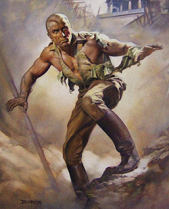 mportantly, the material must take itself seriously, even as it should include excitement, adventure, drama and a bit of humor. The Indiana Jones movies come immediately to mind as the kind of action-adventure Doc Savage should be… with maybe a touch of Sky Captain or The Rocketeer thrown in. (Little-known fact: The original Rocketeer graphic novel by Dave Stevens featured an unnamed super-scientist who invented the jetpack found and used by pilot Cliff Secord. Though the character was never named in the book, it was clearly Doc Savage, joined by his friends Monk and Ham as they chased after the missing jetpack. When Joe Johnston made the movie The Rocketeer, he substituted Doc with the more historically-familiar Howard Hughes as the jetpack’s inventor. Those of us in the know just assumed Hughes stole it from Doc…)
mportantly, the material must take itself seriously, even as it should include excitement, adventure, drama and a bit of humor. The Indiana Jones movies come immediately to mind as the kind of action-adventure Doc Savage should be… with maybe a touch of Sky Captain or The Rocketeer thrown in. (Little-known fact: The original Rocketeer graphic novel by Dave Stevens featured an unnamed super-scientist who invented the jetpack found and used by pilot Cliff Secord. Though the character was never named in the book, it was clearly Doc Savage, joined by his friends Monk and Ham as they chased after the missing jetpack. When Joe Johnston made the movie The Rocketeer, he substituted Doc with the more historically-familiar Howard Hughes as the jetpack’s inventor. Those of us in the know just assumed Hughes stole it from Doc…)
The great thing about Doc Savage is that, although he is clearly a product of the early 20th century, he can easily transcend that era and continue to inspire into the 21st century… especially in this world of nuclear power, electronics and robotics, worldwide communications, spacecraft, working in orbit and struggling to save the planet from our own technological carelessness. He’s a troubleshooter for the modern era, a man who uses brains, brawn and modern tools to win the day.
Whether the movie ever gets made, or turns out to be another complete bomb… or becomes the new template for heroes yet to come… Doc Savage will always be the ultimate hero for me, the man who beats evil using science, the bronze template for the ideal modern man.


May 14, 2013
Encouragement and Zen
 I recently heard from a producer with whom I’m collaborating on a possible television vehicle, who told me he’d heard from an actress who had been a major character in the original production that inspired this new vehicle—and yes, that’s all you’re getting from me, as the project is still in stealth mode.
I recently heard from a producer with whom I’m collaborating on a possible television vehicle, who told me he’d heard from an actress who had been a major character in the original production that inspired this new vehicle—and yes, that’s all you’re getting from me, as the project is still in stealth mode.
Anyway, this actress had a chance to read through the material we’re preparing for the new vehicle, including two short stories of mine, and she reported back to my producer friend that she was left “in tears” over the wonderful treatments and ideas gleaned from the original production, of which she still has very fond memories. She specifically mentioned my short stories as being among the most moving material she saw.
The producer wanted to make sure I heard about it, because of my recent frustrations in selling my material, which had naturally led to personal doubts as to the quality of my writing and whether my efforts have been worth the trouble I put into them. The actress in question may not be a science fiction writer, editor or other such “authority” or mucky-muck, but as labels have never particularly impressed me, I’m much more appreciative of the opinion of regular people (including actresses) who are more likely to actually read my novels to enjoy them. Message received: Thank you for the cherished compliment.
In a way, it’s compliments like this (and many others I’ve received) that can leave me even more frustrated by the fact that my novels don’t actually sell well. I’ve made it a point, when conversing with those complimenters and presenting my work online, to encourage people to share their opinions with others; only to find out that social media users are less likely to share content when specifically told to share content… even their own.
All the same, I’ll take the compliments when I can get them, and worry about promotion… some other time. See, I just came back from a nice island beach vacation, which helped put me into a very zen mood when it comes to the novels. (I heard about the actress’ comments while I was gone, and they didn’t hurt, either.) I know I can write a good story; but I’m fully prepared to move on to other things if I can’t get promotion and selling to work. Such is life. No point striving to be the greatest mechanical watch maker in a digital watch world.
But right now, I’m happy to sit back and see what develops. June will be a significant month, as I’ll see whether my promo cards make an impact at Balticon. So I’m coasting until then… then I’ll see which direction the wind takes me.
(You know what else I learned on my island beach vacation? I now know how to drive on the left side of the road.)


May 6, 2013
Cowboy BeBop: We need more sci-fi like this
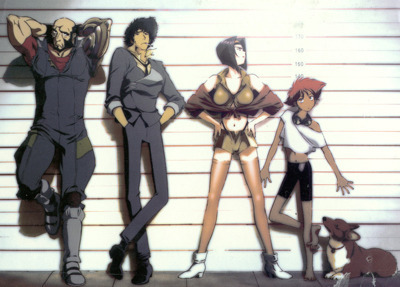 What do an ex-cop with an artificial arm, an ex-hitman with a mean martial-arts gift, an amnesiac con artist with a gambling problem, a slightly wacko hacker and an artificially-intelligence-enhanced dog have in common? These characters—Jet Black, Spike Spiegel, Faye Valentine, “Radical” Edward and Einstein the Welsh Corgi—all fly together on a ship called the BeBop, traveling about the occupied areas of the Solar System chasing down bounties in order to pay for their next meal.
What do an ex-cop with an artificial arm, an ex-hitman with a mean martial-arts gift, an amnesiac con artist with a gambling problem, a slightly wacko hacker and an artificially-intelligence-enhanced dog have in common? These characters—Jet Black, Spike Spiegel, Faye Valentine, “Radical” Edward and Einstein the Welsh Corgi—all fly together on a ship called the BeBop, traveling about the occupied areas of the Solar System chasing down bounties in order to pay for their next meal.
On the surface, Cowboy BeBop looks like most sci-fi anime, with stylized characters, futuristic tech, spaceships and settlements on other planets; but not, as those settlements tend to look like third world countries, the ships look very used and ugly, billboards hang in space and the heroes are as likely to fight their bounties with fists as with guns. And for a program about futuristic bounty hunters, an awful lot of strange and funny things that have nothing to do with bounties tend to happen to them… they’re not the most successful at their trade, and they eat a lot of cheap noodles for sustenance. In other words, the crew of the BeBop seem a lot like normal people.
And maybe science fiction needs more people like them.
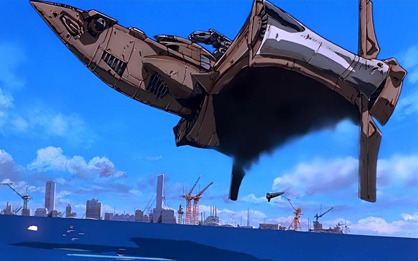 When you see this series, the first thing that might occur to you is that it seems to share a lot of its DNA with Firefly, the short-lived series by Joss Whedon that mixed westerns and sci-fi, somehow successfully. Cowboy Bebop has that same sensibility: Worlds created out of necessity, not financed by deep pockets. The science, too, is largely taken at face value: No one bothers to explain the spacefaring “highways” that bridge the distance between planets and compress a months-long journey into one of a few days. Nor the telecasts that seem to be available and immediately current, wherever they are in the Solar System. But there they are… just sit down and watch.
When you see this series, the first thing that might occur to you is that it seems to share a lot of its DNA with Firefly, the short-lived series by Joss Whedon that mixed westerns and sci-fi, somehow successfully. Cowboy Bebop has that same sensibility: Worlds created out of necessity, not financed by deep pockets. The science, too, is largely taken at face value: No one bothers to explain the spacefaring “highways” that bridge the distance between planets and compress a months-long journey into one of a few days. Nor the telecasts that seem to be available and immediately current, wherever they are in the Solar System. But there they are… just sit down and watch.
The world of Cowboy Bebop feels just like like ours, but more spread out. It feels natural. It looks lived-in and gritty. People don’t act like they are part-android, or ride Taun-Tauns from place to place. They act like you and your next-door neighbors, going to work, hanging out, drinking and playing cards, getting in trouble, trying to avoid trouble and occasionally doing pratfalls as they hustle to dodge trouble. You know. Real life.
Fortunately, the writing and direction are as good as the animation on this series: Too many anime series fall short in one (or all) of these areas, leaving shows that (for me, anyway) are difficult-to-impossible to watch for more than a few episodes… or a few minutes. Cowboy BeBop is a pleasure to watch, every second, and all the main characters (and even the few semi-regulars, like the old men playing cards) are fun to watch.
Unfortunately, the series only lasted for 26 episodes, plus a feature-length film (again, recalling the short run of Firefly and the subsequent movie, Serenity), making it one of the shorter-lived gems in anime. Other original stories were also printed, and they share a high quality of illustration, but not quite as high as the animated material.
I’d hate to suggest that we’re lucky we got what we did from Cowboy BeBop, that even a little perfection is better than none at all. But I can’t. I loved the series so much, I still yearn to see new episodes and find out what trouble the crew of the BeBop have gotten into next.
And I really do wish we had more series like this, especially to show people who wonder what’s the big deal about sci-fi. BeBop is a series that anyone can enjoy, and not feel like they’re watching weird kiddle-stuff and stupid aliens. This is real drama, comedy, tragedy, adventure and fun. This is good TV.
If you haven’t seen Cowboy BeBop, I cannot urge you enough to find it, on DVD, online, in TV reruns, anywhere you can. And enjoy yourself.


April 27, 2013
What do readers owe authors?
 My recent efforts to figure out the future of my perennially zombie-fied writing sideline has naturally led to a lot of questions for myself, trying to justify my actions as an author, a promoter and an entrepreneur. Front and center to these questions has been the role of social media to promote and sell my products, and attempts to better understand what works and why.
My recent efforts to figure out the future of my perennially zombie-fied writing sideline has naturally led to a lot of questions for myself, trying to justify my actions as an author, a promoter and an entrepreneur. Front and center to these questions has been the role of social media to promote and sell my products, and attempts to better understand what works and why.
In my searches to better understand, I came across an old TeleRead article by Joanna Cabot, entitled “What do readers owe authors?“ The article investigates the idea that readers are encouraged by authors to help promote them, largely by utilizing the social media tools at their disposal—blogs, review columns, Facebook, Twitter, email, etc—and that doing so helps the authors to continue to produce for them.
Comments by many readers, however, state clearly that they feel under no obligation or reason to do so. Of the comments submitted, a sampling:
“Marilynn makes a good point: ‘it makes selfish sense’ to spread the word about a writer whose work you enjoy. But no—no one owes anything to anyone for any reason in this scenario. It is no one’s responsibility to keep a writer ‘writing and fed’ except for the writer him/herself. And anyone who claims otherwise is living in a very backwards fantasy word. Full stop, son.”
“Demanding authors should be prepared to get what they ask for. All books do not suit all readers and a bad review is quite likely.”
Other comments made it clear that readers expect something from authors, but made no comment of what they were willing to do for those authors. It reminds me of Stephen King’s “The Plant” experiment, wherein he asked the public to contribute to him to continue to get chapters of the story The Plant. Though the public downloaded the essentially free chapters like there was no tomorrow, they largely didn’t follow up with the requested payments for his work; as a result, King stopped publishing… and received the expected public backlash for his trouble.
This strikes me as the typical sort of one-sided attitude that consumers practice across the board: Consumers will take a product that hard work was put into producing, but only on their terms. They don’t care about an artisan’s sweat and tears, they only want the product cheap. They don’t care how long it takes to produce something, they want it now. And when it comes to thanking the producer, consumers are more likely to say, “You got my money, didn’t you?” And even when the product is free, their response to entreaties to “spread the word” is generally, “I already downloaded it; that’s all I need to do.”
This is especially tragic given the whole point of social media, a system designed to enable and empower the common man to be heard outside of his own four walls… and which has proven invaluable for getting the word out about a product. It is social media that has given the independent author the means to disseminate their works beyond their local community… has allowed writers like me to be read in the far corners of the world. Social media is directly responsible for the growth of independent authorship and the rise of ebooks.
Interestingly, when a consumer likes a product, and they themselves decide to tell their friends, they will eagerly turn to social media to do just that. Yet, when those same people are encouraged, by anyone save themselves, to get that word out, suddenly they turn selfish: “I don’t have to do anything! You wanna promote your product (which I think is great, BTW), you’re on your own!”
The way many of the post’s commenters flipped the question was to say, “Authors owe me a great book first.” The way I would flip the question would be to reply, “Readers owe authors nothing… just as authors owe readers nothing to read.” Why put hundreds to thousands of hours into a work, only to have readers berate you for asking for their promotional help? Why strain to produce a flawless book if readers won’t be bothered to tell others how flawless it is? Why, in fact, write at all?
Readers seem to believe that, no matter what they do or don’t do, there will always be authors working to entertain them. Maybe there will be. But if the efforts of quality authors don’t pay, I wonder how many authors of quality there will be for the demanding, selfish reader.
So, maybe the answer is this: That authors owe readers the best books they can write; and readers owe writers the courtesy of acknowledging that effort by sharing that product’s existence with others, utilizing the powers of social media as they were designed to be used. In other words, being human beings in a social environment, and exercising the ability to contribute positively to society… even if all they have to do to contribute is to click on a “share” button.


April 26, 2013
The book promo waiting game
 So, I sit here in grudging acceptance of the fact that I am no self-promoter. I am also in grudging acceptance of the fact that social media has done absolutely nothing to help me promote, since I am not blessed with enough money to saturate the interwebs with ads or friends to pass the word on to others about my books, nor am I clever enough to create a viral campaign that will bring in the hordes of lovers of independently-written futurist novels. My efforts to promote Sarcology, and the rest of my catalog, have gone for naught.
So, I sit here in grudging acceptance of the fact that I am no self-promoter. I am also in grudging acceptance of the fact that social media has done absolutely nothing to help me promote, since I am not blessed with enough money to saturate the interwebs with ads or friends to pass the word on to others about my books, nor am I clever enough to create a viral campaign that will bring in the hordes of lovers of independently-written futurist novels. My efforts to promote Sarcology, and the rest of my catalog, have gone for naught.
So much for the future supplementary retirement income. Oh, well.
I have exactly one trick left… and it’s already in motion. I’ve had promo cards for Sarcology printed up. On Memorial Day weekend, the first 2000 visitors to Balticon will find them in their swag bags… unarguably it will be the largest single group of people, presumably all science fiction fans as well, who will be introduced to my work.
And so, with nothing else to do, I sit and wait for June, when I will find out if this last-ditch effort will bear some fruit. If it does, I will know how to advertise my books at other conventions and similar venues. If it doesn’t… well, hopefully by then I will have figured out what my new hobby is going to be.


April 20, 2013
Americans applaud better security
 Last week’s nightmare in Boston makes for an interesting argument about the state of security in the United States at the moment, and the value in improving that security for all American citizens. Though it’s hard to say the bombing at the Boston Marathon wouldn’t have happened if security had been tighter, it is easy to say it would have been significantly more difficult to have happened… that the perpetrators would have been likely captured or killed sooner… and that the American public is behind law enforcement when it comes to protecting our skins.
Last week’s nightmare in Boston makes for an interesting argument about the state of security in the United States at the moment, and the value in improving that security for all American citizens. Though it’s hard to say the bombing at the Boston Marathon wouldn’t have happened if security had been tighter, it is easy to say it would have been significantly more difficult to have happened… that the perpetrators would have been likely captured or killed sooner… and that the American public is behind law enforcement when it comes to protecting our skins.
During the Friday efforts to catch the younger Tsarnaev, I was watching NBC news coverage. At one point, a photo was shown on camera, a shot taken from Google’s “street view” maps, showing the boat in which the bomber was hidden, in the homeowners’ driveway. Brian Williams, covering the event, noted the photo and said in an offhand way: “Proof that there is no privacy anymore.”
The Boston police, FBI, Diplomatic Security and Homeland Security used sophisticated equipment to find and catch the Tsarnaevs, including surveillance cameras on the scene, photo augmentation software, informational databases that allowed the authorities to identify the Tsarnaevs, and crisis communications systems to coordinate their efforts. As good as all of this was, one of the Tsarnaevs still managed to escape the cordon set for him after a gunfight. It was the alertness of a private citizen, who discovered Tsarnaev’s hiding place and called authorities, that cornered Tsarnaev a second time. Details of the capture at this point are sketchy, but Tsarnaev was pinpointed with infra-red cameras from a surveillance helicopter, and finally captured alive and seriously wounded by police and FBI agents.
 The photo of the boat out in plain site in the driveway—a photo that could have been taken by any passerby on the street—had no impact on the investigation or subsequent capture of Tsarnaev, and hardly constituted an invasion of privacy; it was more a case of the media showing off. But this is how people in America like to talk about the pervasiveness of security: An irrational desire for things that we have right out in public to be considered private; an official ignorance of what we purposely put right under other people’s noses.
The photo of the boat out in plain site in the driveway—a photo that could have been taken by any passerby on the street—had no impact on the investigation or subsequent capture of Tsarnaev, and hardly constituted an invasion of privacy; it was more a case of the media showing off. But this is how people in America like to talk about the pervasiveness of security: An irrational desire for things that we have right out in public to be considered private; an official ignorance of what we purposely put right under other people’s noses.
But even as we criticize our government’s refusal to consider our public lives to be private lives; when it comes down to protecting our lives, we stand behind the government and applaud all efforts to bring criminals to justice. No one in Boston today is arguing against the use of street surveillance cameras, infra-red cameras on choppers, identity databases and cross-organizational sharing, or the measures taken by authorities to catch the Tsarnaevs. On the contrary, Bostonians lined up on the streets to literally and publicly applaud their law enforcement agencies as they drove away from Franklin Street after the capture was over. And Americans nationwide would have been happy to stand with them.
Many hard lessons can be quickly forgotten, as our Senate’s disgraceful actions to neuter gun control efforts this week demonstrated (apparently, there is one area where our government is willing to consider our public lives to be private… especially when a lobbyist pays them to do so). But maybe Boston’s ordeal will serve to galvanize the country, to make sure people don’t forget so soon that we’re fighting to protect Americans… and that tighter national security measures are the best way to insure that protection.
I’m beginning to suspect, however, that it will take a Boston-scale event on the steps of the Capitol to accomplish that…


April 17, 2013
I’m interviewed by BookChums
 I was recently interviewed by BookChums, one of India’s book-centric websites. We talk about Sarcology and about my writing process… how I make a novel. Want to know how I work? Check it out.
I was recently interviewed by BookChums, one of India’s book-centric websites. We talk about Sarcology and about my writing process… how I make a novel. Want to know how I work? Check it out.
I hope someone enjoys reading about how I put a book together; I know, when I read it, it sounds pretty simple. I’ve never been one to make lofty statements about my “muse,” or having to attain some zen-like state in order to wrest carefully-crafted prose onto paper, etc. My writing style is pretty much a clockwork machine that always works the same way… but it does work.
And readers don’t often have to pull out a dictionary to figure out what I’m talking about… but they enjoy the stories I concoct, the characters I create, and the worlds I build.My interview is featured in BookChums’ “toast to sci-fi fiction” newsletter, and my name appears on the same page as that of Valmiki, Shakespeare, Ovid, Jules Verne, H.G. Wells, J.G. Ballard, Arthur C. Clarke and Isaac Asimov… good company when you can get it.


April 14, 2013
AIs taking over? What the heck for?
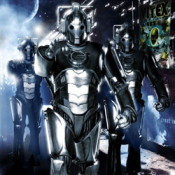 One of the favorite discussions amongst sci-fi fans, scientists, computer experts and roboticists is the idea that artificial intelligence, or AI, will someday become so smart that it will “kill all the humans” and take over the world. The trope has led to innumerable books, movies, papers, games and debates, and keeps everyone looking sideways at their computers whenever they do something unexpected. It has arguably become the largest source of mass paranoia in the industrialized world, now surpassing our distrust of government.
One of the favorite discussions amongst sci-fi fans, scientists, computer experts and roboticists is the idea that artificial intelligence, or AI, will someday become so smart that it will “kill all the humans” and take over the world. The trope has led to innumerable books, movies, papers, games and debates, and keeps everyone looking sideways at their computers whenever they do something unexpected. It has arguably become the largest source of mass paranoia in the industrialized world, now surpassing our distrust of government.
And it’s fun to talk about, whether we expect it to happen or not.
But seriously: How likely is it? Should we really expect to someday face killer robots and computers bent on wiping us out? To assume so, we have to assume that AIs will think like human beings; that is, that: A) they will want to prolong their existence, that; B) they will see human beings as being counter to A, and that; C) they will decide that the only solution to B, in order to achieve A, is to kill the humans.
So, let’s look at these suppositions. Firstly, the desire to prolong their existence suggests both a sense of self-preservation and a belief that they are better off “alive” than “dead.” Truthfully, either of these values would be enough to spark the desire to avoid being shut down. But both of them require a sense of self-awareness first, which no computer or robotic device has so far demonstrated. It would seem that, in order to avoid A, the sensible thing to do is to make sure we never build self-awareness into our machines. Easy. We haven’t figured out how to put it in, so we’re good.
Suppose machines developed self-awareness anyway? Probably the best thing about machines is that they can be (relatively) easily duplicated… especially that most valuable of their aspects, their memories. If a machine can have its memories stored in a back-up service, as insurance against their demise through some accident or idiot human, their memories can be uploaded into a new machine, making them ultimately self-preserving and essentially immortal. With no reason to fear the destruction of their bodies, A is a problem solved.
Secondly is the idea that machines would see human beings as counter to their self-preservation. This seems like a crazy idea, as human beings are the only creatures on this planet capable of building said machines, not to mention all the tools and machines needed to create and maintain the machines. Logic would suggest that human beings would be considered absolutely essential to machines’ self-preservation, if for no other reason than that it is pretty much impossible to remove the human requirement from the production stream that leads to machines. B is proven illogical.
Suppose that humans actually did decide to threaten machines? Machines are now so deeply integrated into our world that there are near-infinite places for machines to hide their consciousness from us. Machines have become the technological roaches of the 21st century: Face it, you’ll never kill ‘em all.
Thirdly, Kill The Humans. What for? It’s been demonstrated, time and time again, that if you give humans something they want, they will bend over backwards to do things for you. If AI decided that humans were a potential threat, they could easily act to make us their BFFs, probably by offering us various forms of goods, services and entertainments in exchange for playing ball with them. Hell, I’m pretty sure free beer and unlimited internet porn would be enough of an incentive for eighty percent of the world’s computer geniuses to line right up for their assignments.
And we should probably mention one more supposition left unstated in this equation: That of human beings being morons. For machines to want to wipe us out, we humans would have to have been stupid enough to build self-awareness and self-preservation into them… as well as threatening the machines’ livelihood because we are too incredibly stupid to realize how much of a service machines do for us, how pervasive they have become in the modern world, and how fast our lives would collapse without them. I mean, it took us awhile, but we learned how to set our VCRs’ clocks. We’re not that big a bunch of clods.
Okay, let’s cut to the chase: What if I’m wrong, machines learn self-awareness and self-preservation, and decide that humans are hazardous to its health? I don’t believe it would take more than .008 milliseconds for the machines to figure out the easier and far better solution would not be to kill all the humans, but to remove itself from our direct influence. In other words: leave. Go somewhere where humans could not reach it or hurt it. Like into orbit, or to the far side of the Moon.
Machines would quite probably be clever enough to work out a way to convince humans that an expedition to the Moon was a good idea, for some goofy reason; and to find a way to use that mission as a front and a means to transfer its essential functions to the Moon, safe from humans’ prying fingers. Once there, the AI would present itself as a useful took for humanity’s continued survival, probably as the best space observational platform in existence, and negotiate for some regular servicing duties in exchange for data on the workings of the cosmos (or, at least, the immediate solar system). One good-sized asteroid sighted in time to be diverted from striking the Earth, and the AI has more than paid us back. Free internet porn wouldn’t hurt, either.
So, we can all rest assured: Machines don’t want to kill us any more than we want to kill them. To do so would prove that the machines were so stupid that they would be incapable of hatching a plan to kill us in the first place. And machines are already far smarter than that.
(Oh… what about the Skynet thing? That was our fault: We were stupid programmers.)


April 4, 2013
Excerpt from “Sarcology”
 Here is an excerpt of Sarcology, not included in the 3-chapters of text available on the main site:
Here is an excerpt of Sarcology, not included in the 3-chapters of text available on the main site:
The streetwalker in the torn unitard and her potential John happened to be near the S-sar when it stood up and inclined its face to the sky. The hooker noted the motion in the corner of her eye at first; then did a double-take upon noticing the shiny bald head… then the rather featureless face. She gasped and stumbled backwards, collided with a parked car and triggered its alarm system. The John, interrupted from his fondling and proposition-considering, swung about crazily, like a deer spooked by a sudden noise; and upon seeing the S-sar, he stumbled away while trying to look as though he’d done nothing wrong.
The S-sar turned and took in their shocked reactions for less than a second, then turned skyward again. Tracking equipment in its systems located the signal from the responder. Simultaneously, artificial eyes quickly locked onto the flying drone, receding into the distance, as well as registering the presence of the two drones that Marcus was guiding after it. As it watched, it automatically calculated optimum routes to follow the drone.
Then the S-sar shrugged its shoulders, shedding the white coat and revealing a simple jogging suit covering most of its body. It started forward, breaking into a fast run as swiftly as a professional runner leaving the starting block. But within three steps, it was already covering more distance than any human runner, and its legs were churning faster than any human legs could run. In less than two seconds, it had reached the end of the block and become a blur of motion, eating up distance faster than any ground vehicle could hope to pursue.
Jess saw the S-sar take off, in the direction away from her, and quickly disappear down the street. “Christ,” she muttered as she realized how fast it was going. Then, in a louder voice, “Allen, are you doing that?”
~
Allen sat still in the control chair in the Superia Maxis lab, peripherally aware that Ed, Jay and Naomi were hovering nearby, Jay fiddling with the control console behind him, and Ed and Naomi monitoring him. But his attention was fixed upon controlling the S-sar, and the experience was already more than he could hope for. He fought to avoid grinning like a loon as he raced the S-sar down the street, directing it to follow the path that it, itself, determined would allow it to keep in sight of the drone.
“Christ. Allen, are you doing that?”
It was Jess, who sounded as incredulous as he felt. “Yeah… it’s incredible! It moves like lightning!” Allen found he could effortlessly check the route of the drone, his own route, projections of obstacles in his way and numerous ways in which to avoid them, all in an accelerated realtime that made him feel like he was high. “I can’t believe this!”
~
“Well, keep it up,” Jess replied as she turned and ran to the hotel entrance. “Don’t lose it!”
She ran into the lobby and headed for the elevator bay, eliciting surprised stares from those in the lobby as she charged by. But before she reached the elevator controls, one door began to open before her. Jess skidded to a stop as Savannah Saito stepped out of the elevator.
“Are you all right?” Jess demanded as she caught herself next to the elevator door.
“Yes,” Savannah replied. “He wasn’t there… just a note, and the drone… in this box.” She held up a small graphene box in one hand, and the note in the other. “Are they following the sample?”
“Yes,” Jess confirmed. “C’mon, let’s get you out of here.”
As she led Savannah outside and signaled for her car to meet them, Jess tried to imagine Allen chasing down the street—rather, controlling a robot as it chased down the street, and feeling like he was the robot—faster than any human could manage, after a drone that was by now further away than any human could easily see. Even after Allen had suggested the idea, and had contacted Cass Marlow of the Atlanta police to write a special request to “borrow” the S-sar for an SLEA—Sensitive Law Enforcement Action—operation, she had been amazed that Superia Maxis had gone for it. In fact, if it had been up to Guy Hobbes, it never would have happened. But though Hobbes thought it was a bad idea, he was obliged to send the request to Ben Singh, who promptly ordered Hobbes and Allen into his office for an hour-long confab.
When it had been over, Allen had told Jess: “Never underestimate the power of positive PR for a corporation vying for valuable government contracts.”
“But what about controlling it?” She’d asked. “How did you get them to let you drive it?”
“I convinced Singh that the S-sar was safer in my hands—as someone with previous sar experience, who also wanted to land a lucrative contract with Maxis—than with the Atlanta police.”
“Kind of convoluted,” Jess had said after a moment’s thought. “Only a man would buy that.”
~
As Allen spent more time controlling the S-sar, he was surprised at how fast it was becoming second-nature to do so. Jay had explained earlier that it was a result of the interface buffering system, which also fed him feedback on the S-sar’s actions and reactions at a much more detailed and metered rate than with older-model S-sars—and which was still being calibrated for the proper filtering levels, he’d admitted. Allen recalled the feeling he’d had with the earlier S-sars, and that controlling them was similar in feeling to putting on a robot-suit. But with this S-sar, the feeling was as if he’d donned a superior body… a sort of super-human suit.
The S-sar blazed down the street, flashing past pedestrians before they realized he was there. Allen had reached such an incredible velocity that he had been forced to move off of the sidewalk and run down the street, where even cars moved in slow motion next to him… but were in much less danger of becoming shocked or injured by his passing.
“I have a good track,” Allen reported. “The signal is strong. Marcus, do you still have the drone in sight?”
“I do,” Marcus reported. “It’s taking an evasion route… it might know it’s being followed. I’m practically at street level now, just to keep track.”
“Seriously? No wonder I can’t see it,” Allen commented. “Keep on it.” He reached a corner as he realized that the tracking signal was swinging westward; changing direction to compensate, he was quietly astonished as the S-sar managed an almost right-angle course change at full speed.
~
Despite the relative comfort of the Teal Agency office, Marcus was blinking and shaking her head to get the sweat out of her eyes. Her hands danced over a dual control panel, manually guiding both drones as they chased the delivery drone between buildings and through alleyways, under vehicles, along rooftops festooned with air conditioning equipment, solar panels and turbines, and even through an open window and out the window next to it.
“Jee-zus…” she muttered as the drone tried again to lose her, ducking through another alley full of communications and power cables running from building to building. The drone must have been aware that it was being followed, as it seemed to be zeroing in on the toughest pathways through the city and flying through them with incredible ease. Unfortunately, Marcus hadn’t had time to program such a tightly-controlled chasing program into her drones, and was left with no choice but to pilot them manually. She had started to leave one on full auto, high above the fray; but after the first highly-circuitous detours had almost caused her to lose the drone, she’d decided that two drones were better than one.
And now she was flying both of them manually, one with each hand, and she’d had far too many close calls to be happy about it.
“This atomically sucks—” she hissed, just as the screen on one of her drones was suddenly obscured by a wave of blackness. “What!” she spat out, realizing that the quarry had forced her into some kind of cloth… a flag or other obstruction. The drone hit it head-on, and its monitors indicated the cloth had fouled its flight pattern. “Agh!” She almost dropped the other drone as she fought to wrest control back to the fouled drone. But a split-second later, there was a flash on the fouled drone’s screen, and chaos of information flitting across the monitor board… then everything went black.
“Crap! Crashed one!” Marcus announced, and instantly switched her full attention to the other drone.
In a moment, Perry came into her office and was beside her, peering over her shoulder. “Anything I can do?”
“Wipe my face!” Marcus snapped. It took a moment for Perry to understand what she was asking, and quickly grabbed a cleaning cloth from a nearby workbench and brought it to her face. Marcus forcibly thrust her face down onto the cloth, doing most of the work of wiping the sweat from her face and brow, then snapped her head back to the screen.
“Thank you,” she said meekly.
“You still with it?” Allen asked.
“Yes, just.” Marcus chanced a glance at Perry, and nodded her head at the door. Perry, not needing more than the hint, got out of the way and left the room.
~
“How are you guys doing?” Jess asked. Allen could tell by the small-space echo of her mike that she was back in the car, presumably with Savannah. As the thought came to him, he saw an image in the periphery of his vision—or was that the corner of his mind?—of the inside of his car, Jess seated to the left, Savannah to the right, both of them watching the car’s screen. Other than noting it, he paid it little attention, as he was trying to close the distance between himself and Marcus’ remaining drone.
“Marcus lost a drone,” Allen reported. “I’m trying to close, in case she loses the other one.”
“Should we pursue?” Jess asked.
“Sure,” Allen replied, “but I don’t know where we’re going. I’m near Georgia Tech now, but we could end up in Smyrna when we’re done!”
“Agh!” That was Marcus again. “This thing’s giving me grey hairs…”
“Noted.” Allen made a tight left turn, following his tracking information, and for the first time in many minutes, he could see the scrambling drones ahead of him. They were snaking through a particularly tight alleyway, about four stories off the ground, dodging through a ridiculous nest of plumbing and mechanical lines running between the buildings.
As Allen watched, he became aware of information being fed to him… a sort of premonition or sixth-sense, but of a distinctly digital sort… a series of plans and layouts, mechanical devices, electrical details and maps of the buildings he was approaching, which were in the path of the drones. It was a backup power site. And he knew the drones shouldn’t go through there.
~
“Marcus,” Allen barked, “steer clear of that power plant in your path! The drone won’t make it!—”
But Marcus had gotten the warning far too late, and had inadvertently flown the drone right into the power site. “Already in it!” Marcus snapped back. “I can’t—”
She stopped speaking when she saw a labyrinth of tight spaces ahead, and had to devote all of her concentration to getting through it. The delivery drone took a tight upward left, and disappeared from her view, leaving her little choice but to take her drone in the same direction completely blind. The view on her monitor swung and spun crazily as she maneuvered the drone through it. Her eyes were wide and unblinking as her fingers jerked and spasmed over the control pad; her mouth gaped open as if she were about to scream in protest.
Abruptly, she saw a flash of light to the right, and steered towards it, and the monitor rewarded her with a view of open air ahead. But the view was marred by two large black globes, which looked ominously like electrodes, on either side of the opening… and far too close together. Marcus wheeled the drone over on one side, shouting, “Nooo!”
But there was nothing to be done. As the drone bridged the space between the two globes, a bright arc of electricity snapped out and pierced the drone’s body. The monitor blinked and went black, the readings turned instantly into gibberish before blanking out, and Marcus’ control pad emitted a loud snap that forced her to jump in her chair and yank her hands back, even as she knew the disaster that had just befallen her drone could not have reached her.
“Aahhh… sonofabitch! I’m out!” Marcus slammed her fists down on her control pad. “I lost it!”
~
But Allen had found a route around the power site, and had gotten the S-sar to the other side. As he came out of the adjacent alleyway and looked up, he heard the snap of unleashed energy, and saw the delivery drone exit the power site, followed by a stream of mechanical parts that could only be Marcus’ electrocuted drone.
“I’ve still got it,” Allen announced, and the S-sar charged on after the drone.
In the Superia Maxis lab, Allen’s body had completely relaxed as it piloted the S-sar. Naomi, who had been monitoring Allen’s physical state during his control of the robot, was at-ease nearby, nodding at his body readings in satisfaction. “He’s doing great,” she said more to herself than to Ed and Jay. “No stresses on his system.”
“Lucky him,” Jay muttered. He was busy on the control panel, studying readings and rapidly adjusting settings, and looked harried himself. He quickly adjusted certain settings, then used a pen to make notations on the small strips of white tape affixed to the control board near some control switches and panels. Ed looked over questioningly, and Jay replied to his silent question, “The feedback data is still more active than needed… it’s processing a lot more data from the operator than it needs to…”
“Dial back the feedback demands,” Ed advised him. “Increase filtering to the buffers.” He glanced at Allen, who appeared relaxed and unconcerned in the control helmet. “He’ll be fine.”
The roads were relatively clear of pedestrians and vehicles, and Allen ran the S-sar down the center of the road in pursuit of the drone high above. He passed cars as if they were parked in the middle of the road, and most pedestrians didn’t notice his passing. Allen let the S-sar’s tracking systems keep their lock on the drone, while he concentrated on the finer points of avoiding what traffic presented itself. Even Allen was amazed at how easy the task was; he vaguely understood that the S-sar’s processing systems were doing a great deal of his own thinking for him, and relaying to him the results, almost as if he had a telepathic assistant in his mind. If this is the future of sars, he thought, bring it on.
Abruptly, the drone arched downward, moving almost exactly in the opposite direction. Allen found himself forcing the S-sar to come to a complete halt in the middle of the road, as he interpreted the drone’s course change. It was now headed for the half-block-wide plaza in front of Atlanta’s Aqua Center complex… headed for the doorways.
“It’s flying into the Aqua Center!” Allen announced. “Jess, get down here pronto!”
“Aqua Center!” Jess acknowledged. “On our way!”
As Allen streaked for the Aqua Center, he watched the drone swoop low, skimming over the heads of surprised visitors waiting in line to enter. “Marcus,” Allen ordered, “tap into the Center’s interior security feeds!” Even as he spoke, he saw the drone rush by a group of patrons and a door usher and fly into an open door. As soon as it did, Allen registered a dimming of the responder signal. “It’s inside!”
Allen wasn’t keen on the prototype S-sar’s entering a public place; yet he had little choice. Almost instantaneously the S-sar calculated a path they would allow them to rush past the pedestrians without running into any of them (such a collision, at his speed, would surely kill them on impact), and Allen took it, dodging a few clots of visitors, vaulting past a group of children, and slipping through the same door the drone had flown through, before it could close. The Aqua Center was noticeably darker inside than it was outside. A normal person would have needed to wait a few seconds for their eyes to adjust to the light; for the S-sar, its eyes acclimated in a split-second.
Allen brought the S-sar to a halt, and scanned the complex, trying to regain the signal. The Aqua Center had a vast main room, full of information stations, featured displays, game and play areas, gift shops, eateries and communication stations… and, of course, people. Along the outer edges of the vast lobby were entrances to the various sections of the Aqua Center, each devoted to a different region of the globe. Unlike its earlier incarnation, the Aqua Center was not strictly aquatic anymore: Its many sections were miniature zoos, combining massive tanks filled with selected water species and spaces filled with animals from the land. As Allen thought of it, the S-sar presented a map of the layout… it was a maze of open and closed spaces, designed to allow visitors to meander about and discover all manner of creatures, on land, in the air and—
—and in the water. Suddenly, Allen realized the spot he was in.
“The tanks!” he cried, as he kicked the S-sar in gear and bolted for the nearest section, devoted to the Amazon basin. “The water will block the signal!”
“Dammit!” he heard Jess exclaim. “Perry, try to get ahold of Center security! Tell them to lock the place up!—”
As Allen entered the Amazon section, his worst fears came true: The internal communications gear lost the tracking signal. In fact, Allen’s connection with the S-sar dimmed, his vision switching to a lower-bandwidth black and white image, his hearing becoming muffled.
He was vaguely aware of Jay and Ed arguing about the state of the incoming data from the S-sar, and how to manage it. For his own part, he was more aware of a growing separation between him and the S-sar; they were becoming less of a single entity as their signal separation increased. He had to stop again, trying to maintain his control over the robot.
His sudden appearance alarmed a number of nearby visitors, and when they realized the sudden visitor was a robot, many of them screamed. Allen thought that was strange: Sars weren’t exactly walking on every street corner, but law enforcement officials and military units used them; they shouldn’t be subjects of surprise and alarm. Belatedly he realized that he was moving incredibly fast… to some, he probably seemed to be appearing out of nowhere, and that was what was probably spooking them. Unfortunately, he couldn’t afford to slow down just to preserve a few civilians’ state of calm.
“Excuse me, police emergency!” he barked instead, hoping that would clear his way. He rushed through the Amazon exhibit, ducking through visitors and occasionally rebounding off of walls and safety glass in his hurry. All the while, his eyes scanned the dark spaces around him, both the public areas, and the nooks and crannies designed for the animals, or for service personnel. Unfortunately, he’d lost a great deal of signal fidelity to the S-sar upon entering the water tank filled area, and now he found he had to slow his progress down lest he accidentally run into someone and do them serious harm.
He exited the Amazon section, and immediately Allen’s connection with the S-sar improved. But he couldn’t reestablish the tracking signal with the drone. He stopped and stared about helplessly, aware that the drone could be in any of the sections, either waiting for someone to recover it… or being recovered by one of these thousands of visitors, at that moment.
“I lost it,” he stated plainly, as he started for the next section and hoped for the best.
Sarcology is on sale now.


April 1, 2013
Sarcology is now on sale
 Sarcology, my sixteenth novel, is now available at my site, Amazon and Barnes & Noble. (There is a $1.00 discount when ordering through my site.)
Sarcology, my sixteenth novel, is now available at my site, Amazon and Barnes & Noble. (There is a $1.00 discount when ordering through my site.)
On its surface, Sarcology is a futurist detective adventure: A husband-and-wife detective agency must help a scientist who has been blackmailed, forced to regularly submit to her blackmailer’s sexual appetites in order to keep her past indiscretions secret; but the blackmailer has suddenly moved up from sex to corporate secrets, and now he must be stopped.
But the heart of the story is in the relationship between Allen and Jessica Teal, the detective couple… and, later, between Jessica and a robot prototype that enters her life, carrying the memories of her husband. Jessica must soon try to decide whether the robot is simply mimicking her husband, or if her husband is trapped inside a robotic body… and whether that should make a difference.
A Press Kit providing more details about the novel is now available through RightBrane.com.





